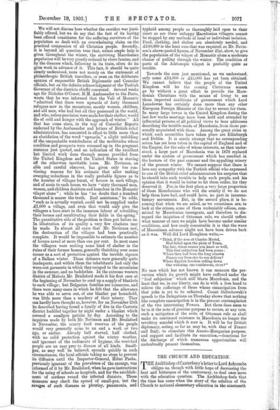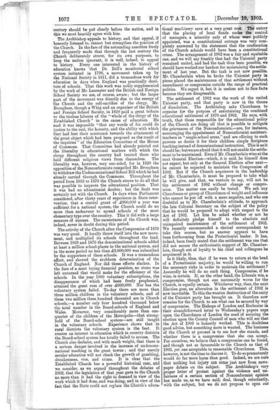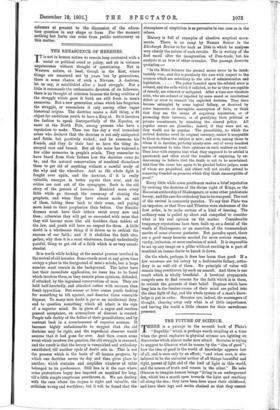THE CHURCH AND EDUCATION.
THE Archbishop of Canterbury's letter to Lord Asheombe obliges us, though with little hope of decreasing the heat and bitterness of the controversy, to deal once more with the education question. The Archbishop feels that the time has come when the story of the' relation of the Church to national elementary education in the nineteenth century should be put clearly before the nation, and in this we most heartily agree with him.
The Archbishop appeals to history, and that appeal, if honestly listened to, cannot but strengthen the position of the Church. In the face of the astounding assertion freely and frequently made that through the last century the 'Church deliberately strove, for its own purposes, to keep the nation ignorant, it is well, indeed, to appeal to history. Every one interested in the history of education knows that Dr. Bell's monitorial school system initiated in 1798, a movement taken up by the. National Society in 1811, did a tremendous work for education in days when England was practically desti- tute of schools. That this work was nobly supplemented by the work of Mr. Lancaster and the British and Foreign School Society we are, of course, aware ; but the larger part of the movement was directly due to the energy of the Church and the self-sacrifice of the clergy. Mr.
Brougham, though a Whig and an organiser of the British and Foreign School Society, in 1820 paid a great tribute to the tireless labours of the "whole of the clergy of the Established Church " in the cause of education. He said it was impossible " that any words of his could do justice to the zeal, the honesty, and the ability with which they had lent their assistance towards the attainment of the great object which had been proposed as the result of the inquiries " of the Education Committee of the House of Commons. That Committee had already pointed out the liberality in educational matters with which the clergy throughout the country had treated those who held different religious views from themselves. The liberality was, however, very one-sided, for in 1820 the opposition of the Nonconformists compelled Mr. Brougham to withdraw the Undenominational School Bill which he had already carried through the Commons. Throughout the period from 1833 to 1870 the Church strove to do all that was possible to improve the educational position. That it was bad no educationist doubts ; but the fault was certainly not with the Church. In days when Parliament considered, after thirty years of experience in State inter- vention, that a central grant of £800,000 a year was sufficient for a national system, the Church could do no more than endeavour to spread schools of the most elementary type over the country. This it did with a large measure of success. The earnestness of the Church was, indeed, never in doubt during this period.
The activity of the Church after the Compromise of 1870 was very great. It loyally threw itself into the new move- ment, and multiplied its schools throughout the land. Between 1869 and 1876 the denominational schools added at least a million school-places to the national system, and in the same period no less than £3,000,000 was subscribed by the supporters of these schools. It was a tremendous effort, and showed the stubborn determination of the Church of England. Nor did these efforts slacken. In the face of a most trying financial position, no stone was left unturned that would make for the efficiency of the schools. In the year 1900 voluntary subscriptions, the disappearance of which had been freely prophesied, attained the great sum of over £800,000. Nor has the voluntary system failed. To-day there are more than three million children in the voluntary schools, and of these two million three hundred thousand are in Church schools,—a number only four hundred thousand below the total number in the Board-schools of England and Wales. Moreover, very considerably more than one- quarter of the children of the Metropolis—that strong- hold of the Board-school system—are still taught in the voluntary schools. Experience shows that in rural districts the voluntary system is the best. It creates an interest in education which in country districts the Board-school system has totally failed to arouse. The Church also declares, and with much weight, that there is a serious danger involved in the increase of undenomi- national teaching in the great towns ; and that merely secular education will not check the growth of gambling, drunkenness, vice, and crime. It is clear that the Established Church has a powerful historical case, and we consider, as we argued throughout the debates of .1902, that the legislation of that Jear gave to the Church no more than it had the right to demand in view of the work which it had done, and was doing, and in view of the fact that the State could not replace the Church's educa,- tional machinery save at a very great col* 7.rwir outcry that the placing of local funds under ilts control of managers, a minority only of whom were publicly appointed, was a constitutional outrage was very com- pletely answered by the statement that the confiscation of the Church schools would have been. a constitutional crime. The arrangement of 1902 was a fair and equitable one, and we will say frankly that had the Unionist party remained united, and had the task thus been possible, we should have worked our hardest for maintaining the settle:- ment of last year. But the task is not now possible.
Mr. Chamberlain when he broke the Unionist party in pieces placed the maintenance of that settlement without amendment or compromise outside the range of practical politics. We regret it, but it is useless not to face facts because they are disagreeable.
The settlement of 1902 was the work of the united Unionist party, and that party is now in the throes of dissolution. The Archbishop asks Churchmen to organise for the purpose of maintaining the combined educational settlement of 1870 and 1902. He says, with truth, that those responsible for the educational policy of the Church are doing all that is possible to mitigate the grievances of the Nonconformists,—are, for instance, encouraging the appointment of Nonconformist assistant- teachers in " single-school areas," and are offering to such parents as desire it for their children simple Scripture teaching instead of denominational instruction. This is as it should be; butwe are afraid that it will not enable the settle- ment to be maintained. Even if Mr. Chamberlain wins at the next General Election—which, it is said, he himself does not expect, but only at the General Election after next— he cannot be expected to maintain the Compromise of 1902. But if the Church acquiesces in the leadership of Mr. Chamberlain, it must be prepared to take what he will give, and that, we venture to say, will not be the settlement of 1902 without change or compro- mise. The matter can easily be tested. We ask any Churchman or group of Churchmen of weight and influence who cannot be put off with a mere negative, and who are doubtful as to Mr. Chamberlain's attitude, to approach the late Colonial Secretary on the subject of the policy that he would. be prepared to adopt with respect to the Act of 1902. Let him be asked whether or not he will definitely pledge himself to the absolute and unimpaired maintenance of the settlement of 1902. We recently recommended a clerical correspondent to take this course, but no answer appears to have been forthcoming from the Protectionist leader. It has, indeed, been freely stated that the settlement was one that did not secure the enthusiastic support of Mr. Chamber- lain, though out of loyalty to his chief and colleagues he acquiesced in it.
Is it likely, then, that if he were to return at the head of a Protectionist majority, he would be willing to run the necessary risks in order to maintain the settlement ? Assuredly he will do no such thing. Compromise, if he wins, is certain. If, on the other hand, the Liberals win, a compromise, though not one necessarily worse for the Church, is equally certain. Whichever way, then, the next Election goes, an alteration in the settlement of 1902 is now inevitable. To this the wanton destruction of the unity of the Unionist party has brought us. It therefore now remains for the Church to see what can be secured by way of compromise. The Bishops of London and Rochester in their straightforward letter to Wednesday's papers urge upon the Churchmen of London the need of securing the election upon the County Council of men who will see that the Act of 1903 is honestly worked. This is doubtless good advice, but something more is wanted. The business of the Church at present is to see how she stands, and whether there is a compromise that she can accept. For ourselves, we believe that a compromise can be found, and though not so favourable to the Church as that of 1902, yet one acceptable to reasonable Churchmen. This, however, is not the time to discuss it. To do so prematurely would. do far more harm than good. Indeed, we are sure that nothing but injury can come just now from news- paper debate on the subject. The Archbishop's very proper letter of protest against the violence and un.- fa •r ness of a _ certain section of Nonconformist opinion has made us, as we have said, deal, though reluctantly, with the subject, but we dO not propose to open our
columns at present to the discussion of the educa- tion question in any shape or form. For the moment nothing but harm can come from public controversy on this matter.




















































 Previous page
Previous page